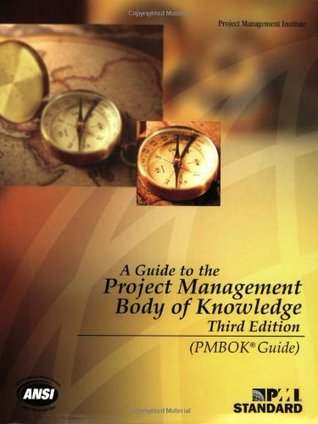Guide Project Management Body Knowledge Pmbok Guide Pdf
Posted : admin On 20.10.2019Project management body of knowledge pmbok guide pdf The Knowledge and Foundation to Succeed. PMI global standards provide guidelines, rules and characteristics for. A Guide to the Project Management Body of Knowledge PMBOK® Guide 2000 Edition PROJECT MANAGEMENT INSTITUTE PMBOK® Guide - 2000 Edition About This PDF and Its Contents.
Ensure that your project management knowledge and frameworks are up to date. Turn to PMI global standards as the foundation of the profession. And because they’re created and updated by both volunteer committees and the interested public, you can be confident that our standards continually and accurately reflect the evolving profession. A Guide to the Project Management Body of Knowledge ( PMBOK ® Guide) – Fifth Edition is the preeminent global standard for project management.

It provides project professionals with the fundamental practices needed to achieve organizational results and excellence in the practice of project management. Like previous editions, this standard presents generally recognized good practices and reflects continually evolving knowledge.

A Guide to the Project Management Body of Knowledge (the PMBOK Guide) Author Genre Business Published 2017 Pages 592 (sixth edition) The Project Management Body of Knowledge is a set of standard terminology and guidelines (a ) for. The body of knowledge evolves over time and is presented in A Guide to the Project Management Body of Knowledge (the Guide to the PMBOK or the Guide), a book whose sixth edition was released in 2017.
The Guide is a document resulting from work overseen by the (PMI), which offers the and certifications. Much of the PMBOK Guide is unique to project management e.g. The PMBOK Guide also overlaps with which both including planning, organising, staffing, executing and controlling the operations of an organisation. Other management disciplines which overlap with the PMBOK Guide include, and other planning methods. Contents.
Project Management Body Knowledge
History Earlier versions of the PMBOK Guide were recognized as standards by the (ANSI) which assigns standards in the United States (ANSI/PMI 99-001-2008) and the (IEEE 1490-2011). The evolution of the PMBOK Guide is reflected in editions of the Guide. The Guide was first published by the (PMI) in 1996.
That document was to some extent based on earlier work that began with a published in 1983 called the 'Ethics, Standards, and Accreditation Committee Final Report.' The second edition was published in 2000. In 2004, the PMBOK Guide — Third Edition was published with major changes from the previous editions. The Fourth edition was published in 2008. The latest English-language version of The PMBOK Guide — Fifth Edition was released in 2013. The 'Sixth Edition' was released in September 2017.
Purpose The PMBOK Guide is intended to be a 'subset of the project management body of knowledge that is generally recognized as a good practice. 'Generally recognized' means the knowledge and practices described are applicable to most projects most of the time and there is a consensus about their value and usefulness. 'Good practice' means there is a general agreement that the application of the knowledge, skills, tools, and techniques can enhance the chance of success over many projects.' This means that sometimes the 'latest' project management trends, often promoted by consultants, may not be part of the latest version of The PMBOK Guide. However, the 6th Edition of the PMBOK Guide now includes an 'Agile Practice Guide' Contents The PMBOK Guide is process-based, meaning it describes work as being accomplished by processes.
This approach is consistent with other management standards such as and the 's. Processes overlap and interact throughout a project or its various phases. Inputs (documents, plans, designs, etc.). Tools and Techniques (mechanisms applied to inputs). Outputs (documents, plans, designs, etc.) A Guide to the Project Management Body of Knowledge — Sixth Edition provides guidelines for managing individual projects and defines project management related concepts.
It also describes the project management life cycle and its related processes, as well as the project life cycle. And for the first time it includes an 'Agile Practice Guide'. The PMBOK as described in the Guide recognizes 47 processes that fall into five basic process groups and ten knowledge areas that are typical of most projects, most of the time. Process groups The five process groups are:. Initiating: processes performed to define a new project or a new phase of an existing project by obtaining authorization to start the project or phase.
Planning: Those processes required to establish the scope of the project, refine the objectives, and define the course of action required to attain the objectives that the project was undertaken to achieve. Executing: Those processes performed to complete the work defined in the project management plan to satisfy the project specifications. Monitoring and Controlling: Those processes required to track, review, and regulate the progress and performance of the project; identify any areas in which changes to the plan are required; and initiate the corresponding changes. Closing: Those processes performed to finalize all activities across all Process Groups to formally close the project or phase.
Knowledge areas The ten knowledge areas, each of which contains some or all of the project management processes, are:.: the processes and activities needed to identify, define, combine, unify, and coordinate the various processes and project management activities within the. Project management: the processes required to ensure that the project includes all the work required, and only the work required, to complete the project successfully.: the processes required to manage the timely completion of the project.
Until the 6th edition of the PMBOK Guide this was called 'Project Time Management'.: the processes involved in planning, estimating, budgeting, financing, funding, managing, and controlling costs so that the project can be completed within the approved budget. Project: the processes and activities of the performing organization that determine quality policies, objectives, and responsibilities so that the project will satisfy the needs for which it was undertaken. Project: the processes that organize, manage, and lead the project team. Until the 6th edition of the PMBOK Guide this was called 'Project Human Resource Management'. Project: the processes that are required to ensure timely and appropriate planning, collection, creation, distribution, storage, retrieval, management, control, monitoring, and the ultimate disposition of project information.: the processes of conducting risk management planning, identification, analysis, response planning, and controlling risk on a project.: the processes necessary to purchase or acquire products, services, or results needed from outside the project team.
Processes in this area include Procurement Planning, Solicitation Planning, Solicitation, Source Selection, Contract Administration, and Contract Closeout. Project: the processes required to identify all people or organizations impacted by the project, analyzing stakeholder expectations and impact on the project, and developing appropriate management strategies for effectively engaging stakeholders in project decisions and execution. Each of the ten knowledge areas contains the processes that need to be accomplished within its discipline in order to achieve effective project management.
Each of these processes also falls into one of the five process groups, creating a matrix structure such that every process can be related to one knowledge area and one process group. Extensions While the PMBOK Guide is meant to offer a general guide to manage most projects most of the time, there are currently three official extensions:. Software Extension to the PMBOK Guide. Construction Extension to the PMBOK Guide. Government Extension to the PMBOK Guide Criticism and alternatives The PMBOK is a widely accepted standard in project management, however there are alternatives to the PMBOK standard, and PMBOK does have its critics.
One thrust of critique has come from the developers and followers (e.g. And ), as opposed to adherents.
Project Management Institute
The PMBOK Guide section on Project Time Management does indicate Critical Chain as an alternative method to Critical Path. A second strand of criticism originates in. This approach emphasises the lack of two way communication in the PMBOK model and offers and alternative which emphasises a and in the planning process. See also. for Quality Management on Projects. for Project Management. for Risk Management.
Business

References. IEEE (2011),. A Guide to the Project Management Body of Knowledge, copyright page, edition 2, and edition 3 2004, and edition 4 2008. Project Management Institute, retrieved 11 July 2017.
^ Project Management Institute, A Guide to the Project Management Body of Knowledge – Fifth Edition, Project Management Institute Inc., 2013, Page 2. And Lawrence P. (Artech House Professional Development Library). Koskela, L. (2002) 'The underlying theory of project management is obsolete', Proceedings of the PMI Research Conference 2002, 293-302. External links., at PMI. (dated but free).
with columnists' blogs and some free study materials.
